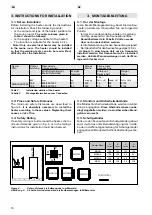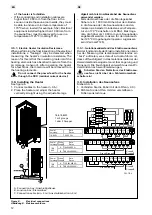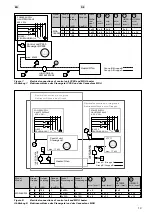
EN
DE
9
D
B
min. 500 mm
min.
500 mm
min. 1000 mm
360°
180°
2.2. Sauna Room Ventilation
The air in the sauna room should change six times
per hour. Figure 3 illustrates different sauna room
ventilation options.
A. Supply air vent location. If mechanical exhaust
ventilation is used, place the supply air vent
above the heater. If gravity exhaust ventilation
is used, place the supply air vent below or
next to the heater. The diameter of the supply
air pipe must be 50–100 mm.
Do not place
the supply air vent so that the air flow cools
the temperature sensor (see the temperature
sensor installation instructions in the control
unit installation instructions)!
B. Exhaust air vent. Place the exhaust air vent near
the floor, as far away from the heater as possible.
The diameter of the exhaust air pipe should be
twice the diameter of the supply air pipe.
C. Optional vent for drying (closed during heating
and bathing). The sauna can also be dried by
leaving the door open after bathing.
D. If the exhaust air vent is in the washroom, the
gap underneath the sauna door must be at
least 100 mm. Mechanical exhaust ventilation
is mandatory.
2.3. Heater Output
When the walls and ceiling are covered with panels
and insulation behind the panels is adequate, the
heater output is defined according to the volume of
the sauna. Non-insulated walls (brick, glass block,
glass, concrete, tile, etc.) increase the need for
heater output. Add 1,2 m³ to the volume of the
sauna for each non-insulated wall square meter. For
example, a 10 m³ sauna room with a glass door
equals the output requirement of about a 12 m³
sauna room. If the sauna room has log walls,
multiply the sauna's volume by 1,5. Choose the
correct heater output from Table 2.
2.4. Sauna Room Hygiene
Bench towels should be used during bathing to
prevent sweat from getting onto the benches.
The benches, walls and floor of the sauna should
be washed thoroughly at least every six months.
Use a scrubbing brush and sauna detergent.
Wipe dust and dirt from the heater with a damp
cloth. Remove lime stains from the heater using a
10% citric acid solution and rinse.
Figure 3.
Abb. 3.
2.2. Belüftung der Saunakabine
Die Saunaluft sollte sechsmal pro Stunde ausge-
tauscht werden. Abb. 3 zeigt verschiedene Optio-
nen der Saunabelüftung.
A. Luftzufuhr. Bei mechanischer Entlüftung Luft-
zufuhr über dem Ofen anbringen. Bei Schwer-
kraftentlüftung Luftzufuhr unter oder neben
dem Ofen anbringen. Der Durchmesser des
Luftzufuhrrohres muss 50–100 mm betragen.
Luftzufuhr nicht so anbringen, dass sie den
Temperaturfühler abkühlt (zur Anbringung des
Temperaturfühlers siehe Installationsanweisun-
gen des Steuergeräts)!
B. Entlüftung. Entlüftung in Bodennähe anbringen,
so weit weg vom Ofen wie möglich. Der Durch-
messer des Entlüftungsrohres sollte doppelt so
groß sein wie bei der Luftzufuhr.
C. Optionale Lüftung zum Trocknen (während
Heizung und Bad geschlossen). Die Sauna kann
auch durch die offene Tür getrocknet werden.
D. Wenn die Entlüftung im Waschraum liegt,
muss die Lücke unter der Saunatür mindestens
100 mm betragen. Mechanische Entlüftung ist
Pflicht.
2.3. Leistungsabgabe des Ofens
Wenn Wand und Decke vertäfelt und ausreichend
isoliert sind, richtet sich die Leistungsabgabe des
Ofens nach dem Volumen der Sauna. Nicht isolierte
Wände (Stein, Glasbausteine, Glas, Beton, Kacheln)
erhöhen die benötigte Ofenleistung. Jeder Quadrat-
meter nicht isolierter Wand entspricht 1,2 m³ mehr
Saunavolumen. Eine 10 m³ große Saunakabine mit
Glastür z.B. entspricht in der Leistungsabgabe einer
12 m³ großen Sauna. Bei Balkenwänden Saunavo-
lumen mit 1,5 multiplizieren. Korrekte Leistungsab-
gabe des Ofens aus Tabelle 2 wählen.
2.4. Hygiene der Saunakabine
Liegetücher benutzen, um die Bänke vor Schweiß
zu schützen.
Bänke, Wände und Boden der Sauna mindestens
alle sechs Monate waschen. Bürste und Saunarei-
nigungsmittel verwenden.
Staub und Schmutz vom Ofen mit feuchtem Tuch
abwischen. Kalkablagerungen am Ofen mit 10 %
Zitronensäure entfernen und spülen.

































